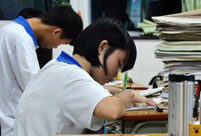 Luoyang aims to become 'Chinese Culture City'
Luoyang aims to become 'Chinese Culture City'
 Century-old jade disc found confirms ancient legend
Century-old jade disc found confirms ancient legend
 A serious mind behind Chinese leader
A serious mind behind Chinese leader
 Panda Cubs to Predict 2014 World Cup Winners
Panda Cubs to Predict 2014 World Cup Winners
 China Southern Airlines flight attendants win titles in service contest
China Southern Airlines flight attendants win titles in service contest
 Pupil's performance art persuades people to stop smoking
Pupil's performance art persuades people to stop smoking
 Nie Chenxi's clay tigers
Nie Chenxi's clay tigers
 Children's Day wishes
Children's Day wishes
 Chinese Kung Fu charms Silicon Valley
Chinese Kung Fu charms Silicon Valley
 Tranquil Yankou ancient town
Tranquil Yankou ancient town
A sense of urgency behind scientific and technological innovation will bring the Chinese dream of national rejuvenation closer.
Scientists must contribute to the Chinese dream by stepping up innovation efforts, said Chinese Vice Premier Liu Yandong on Wednesday.
Liu Made the remarks at the ongoing conference of the country's two top think tanks, the Chinese Academy of Sciences (CAS) and Chinese Academy of Engineering (CAE).
At the opening ceremony of the biennial event on Monday, President Xi Jinping said China had never been so close to realization of the great dream, and an innovation-driven development strategy was key to that end.
The direction of China's science and technology development is "innovation, innovation and innovation, " Xi said.
China must press ahead to catch up with new developments in sci-tech innovation and try to become a leading force, Xi said.
"There is no time like the present," the President told more than 1,300 academics from the two institutions, which advise the government and industry on science and technology.
Xi pointed out that independent innovation should be the essence of the development strategy and the most urgent thing to do was to eliminate obstacles to free science and technology to become the primary force of productivity.
Since 2011, China has conducted four space missions, including the orbiting space lab Tiangong-1, spacecraft Shenzhou-8, Shengzhou-9 and Shenzhou-10, and the rendezvous and docking of the Tiangong-1 with the spacecraft.
The China Innovation Index (CII), a barometer of innovation capability, rose 6.2 percent in 2012 to 148.2 points, according to a statement by the National Bureau of Statistics (NBS) in February .
Compared with a base of 100 points in 2005, the new figure represents a compound annual increase of 5.8 percent, the NBS said in the statement.
With these achievements, the funds poured into innovation also expanded.Total expenditure on R&D topped 1 trillion yuan (about 168 billion U.S. dollars) in 2012, about 1.97 percent of gross domestic product.
Patent applications have also increased. The government accepted nearly 2.38 million patent applications and authorized over 1.31 million in 2013, according to official statistics. The number of invention patent applications was 825,000, up 26.3 percent year on year.
Companies known for technological innovation also emerged. In the smartphone market, domestic brands such as Lenovo, Coolpad, Huawei and ZTE have been increasingly popular.
Though the economy is big, it is not solid, said Xi adding that development through resource investment is not suitable for China.
"The population of developed countries altogether amounts to 1 billion, while China has more than 1.3 billion people," Xi said. To modernized society is a daunting task. Scientific and technological innovation is vital, but problems in the technological sector could hamper innovation.
It is true that the nation's R&D spending has been rising, but not all of that money was spent on desirable projects. Audits show that research funds have been used for conferences, overseas visits, renovations, benefits for researchers, and other unexpected ends. Another problem lies in the transforming research into production.
Innovation capability needs to be enhanced, because it still does not control key technology in core areas.
As Xi noted, the nation's foundation of technological innovation is not solid and the capability for independent innovation, especially creativity, is not strong.
"We cannot count on the scientific and technological achievements of other nations to upgrade our own technology," Xi said.
Xi urged the engineers and scientists to blaze new trails and aim for excellence.
 Can't take eyes off national teams in World Cup
Can't take eyes off national teams in World Cup Graduation photos bring memories back to life
Graduation photos bring memories back to life Art school students present works in Nanjing
Art school students present works in Nanjing Xinjiang's first high-speed railway goes on trial run
Xinjiang's first high-speed railway goes on trial run 3D Sea-life Themed Art Garage unveiled in Zhengzhou
3D Sea-life Themed Art Garage unveiled in Zhengzhou
 Creative Photos go viral during graduation season
Creative Photos go viral during graduation season Students in last-minute effort for Gaokao
Students in last-minute effort for Gaokao Opening ceremony of 67th Cannes Film Festival
Opening ceremony of 67th Cannes Film Festival Pulse of Xiamen - Int'l Yoga art festival in May
Pulse of Xiamen - Int'l Yoga art festival in May Top 20 hottest women in the world in 2014
Top 20 hottest women in the world in 2014  Dali, an ideal summer vacation destination
Dali, an ideal summer vacation destination Xichan Temple's little monk hit the Internet
Xichan Temple's little monk hit the Internet Monologue of a modern dancer
Monologue of a modern dancer College girl proposes to boyfriend on Weibo
College girl proposes to boyfriend on Weibo Special operation members in counter-terrorism training
Special operation members in counter-terrorism trainingDay|Week|Month